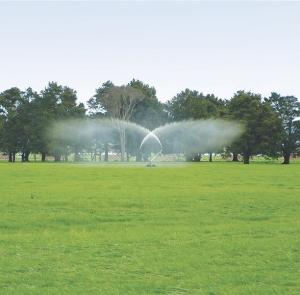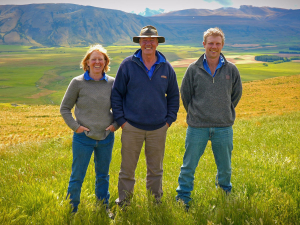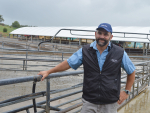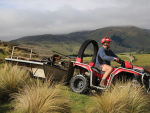Too much fertiliser, or fertiliser applied at the wrong time or in the wrong place, can end up detracting from the health of waterways via run-off or leaching. Such losses also mean the hard cash spent on fertiliser isn’t yielding the maximum economic reward.
But too little fertiliser can compromise production.
Use of a sound nutrient management plan can help avoid these sorts of problems.
Before buying fertiliser, I recommend farmers look at their nutrient budgets and talk to a fertiliser reps about their individual properties.
But there are general strategies farmers can use to help avoid problems such as nitrate (N) leaching to ground water, excessive phosphorus levels in soil (measured by Olsen P) and stock poisoning.
While stock urine is the main contributor to nitrate leaching, losses can also be markedly increased if too much N fertiliser is applied.
Losses to groundwater are likely to be highest during times of excess rainfall and low soil temperatures that limit pasture growth and N uptake – autumn, winter and early spring.
So farmers can reduce the amount of N leaching and runoff from pasture by not applying fertiliser when plant uptake of nitrogen is low, such as when soils are saturated, during heavy rain, colder periods and when soil temperatures are low.
Other measures include:
Applying N fertiliser in split dressings (a little and often)
Making sure farm dairy effluent is applied at low rates and to a large enough area
Adjusting fertiliser policy for effluent irrigated areas to account for the nutrient value of effluent
Standing cows off pasture during wet weather and capturing their effluent for later application
Fencing off wetlands and open drains.
On the other hand, phosporous (P) is not a significantly ‘leaky’ element leaching through soils because it binds tightly to soil particles. This means P gets into waterways mostly as a result of erosion. So any bare soil on sloping land creates a risk of P transport to water bodies.
Tracks and races can also be a source of P runoff to water. The risk of such runoff is obviously higher if Olsen P is excessive.
Farmers can reduce the amount of P running off by ensuring they don’t apply phosphate fertiliser when heavy rain is forecast. Farmers should also:
Apply fertiliser when the grass is in an actively growing phase
Make sure fertiliser isn’t applied near waterways
Leave a grassed buffer strip between paddock and waterway – the strip helps to filter out some of the nutrients before the runoff reaches the water
Control runoff from tracks, races, feed and stand-off pads.
Also remember fertiliser can be poisonous to stock if ingested directly. Make sure animals don’t have direct access to fertiliser bins or other storage facilities and don’t graze pasture if fertiliser particles are visible; it’s best to wait until sufficient rain has washed the particles into the soil.
Voluntary guidelines and codes of practices, developed by the farming industry are helpful in managing nutrients. These include the Code of Practice for Nutrient Management, Fertmark and Spreadmark.
• Bala Tikkisetty is a sustainable agriculture co-ordinator at Waikato Regional Council. This email address is being protected from spambots. You need JavaScript enabled to view it.
















